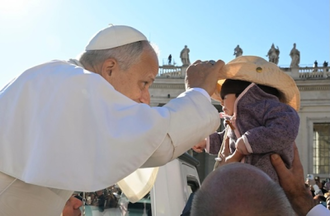Pope Leo: We are brothers and sisters all

Image Vatican Media
Source: Vatican Media
During the General Audience yesterday, Pope Leo stressed the importance of fraternity in our lives and described it as something "deeply human". He said that even though today's wars, tensions, and conflicts make fraternity seem difficult, without it, "we would not be able to survive, grow, or learn."
Reflect on the death and resurrection of Christ and how living this paschal spirituality in our daily lives "imbues life with hope and encourages us to invest in goodness," Pope Leo highlighted how this helps us nurture fraternity, which is "without a doubt one of the great challenges for contemporary humanity, as Pope Francis saw clearly."
Pope Leo stressed that fraternity comes from something "deeply human." As human beings, we have the ability to form relationships and bonds with others. Without these relationships, the Pope stated, "we would not be able to survive, grow or learn." When we coexist and live together, then our humanity is "best fulfilled".
On the other hand, if we retreat into ourselves, we risk becoming lonely and, potentially, narcissistic as we are concerned only with ourselves. "The other is then reduced to someone from whom we can take, without ever being truly willing to give, to offer ourselves", Pope Leo explained.
Fraternity cannot and must not be taken for granted, even though today's conflicts, wars, social tensions, and feelings of hatred appear to contradict this. However, the Pope noted, "fraternity is not a beautiful but impossible dream; it is not the desire of a deluded few."
But to find the antidote to the illnesses that try to overpower fraternity, he continued, we must turn to the source where we can be strengthened that is, God.
The word fraternity comes from an ancient root that means "to care for, to have at heart, to support and sustain." A good example is the role of a brother or sister or, in general, being part of the same family. All of us know that disagreements and division can hurt relationships, whether it is within families or between strangers.
Therefore, there is a greater need today to ponder the greeting St Francis of Assisi would use to address everyone, no matter who they were: 'Omnes fratres' - 'all brothers' and it put everyone on the same level, recognising their common dignity.
Centuries later, Pope Francis followed this example with his encyclical Fratelli tutti. This "tutti" is "an essential feature of Christianity". This fraternity, Pope Leo highlighted, is based on the commandment of Jesus: "Thanks to Him, who loved us and gave Himself for us, we can in turn love one another and give our lives for others".
As the Gospel of John says, Jesus loved us to the very end. Ahead of His passion, knowing what will happen, He "experiences the most terrible torment and abandonment." But, in just three days, a new history begins with His Resurrection. With this, the disciples "become fully brothers and sisters" because "they recognise Him as the Risen One, receive the gift of the Spirit and become witnesses to Him."
Pope Leo concluded by challenging everyone to support their brothers and sister in the midst of challenges and hardships. "Do not turn their back on those who are in need, and they weep and rejoice together in the active pursuit of unity, trust, and mutual reliance," he said.
We are called to love each other as Christ loved us. The Pope stated that "the fraternity given by Christ…frees us from the negative logic of selfishness, division, and arrogance, and restores to us our original vocation, in the name of a love and a hope that are renewed every day." Jesus' Resurrection shows us the way to reach Him - through being "brothers and sisters all".
Watch the General Audience on the Vatican Media Youtube channel: www.youtube.com/watch?v=oRDnT6Tm9h8


















